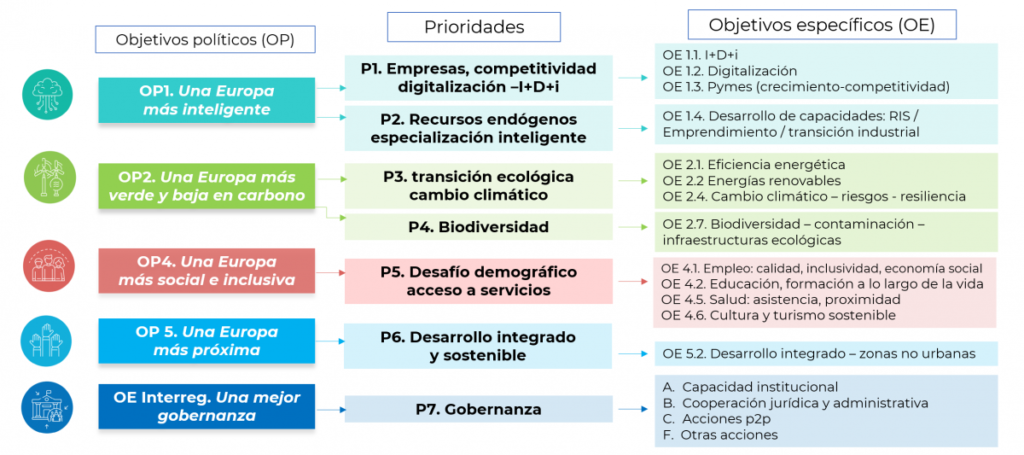The Interreg Cooperation Programme Spain-Portugal 2021-2027, as the name implies, is a cooperation programme between the Iberian countries that comprises projects during the years 2021-2027. This programme promotes development and cooperation in the border between Spain and Portugal through the ERDF funds.
Within the Cohesion Policy, there is a finance instrument named Interreg, which aims to boost regional development through cooperation. This instrument is divided into 5 areas, following the existing types of cooperation. The POCTEP programme is framed under the Interreg instrument and falls under the cross-border area (Interreg A).
The acronym POCTEP comes from “Cross-border cooperation operative programme Spain-Portugal”, developed between 2007-2013. Subsequently this programme led to a second edition conducted between 2014-2020 named “Interreg Cooperation Programme Spain-Portugal”. The current POCTEP is the third edition and the Chamber of Commerce of Zamora is a partner in four projects, which will be developed during the years 2024-2026.
The POCTEP programme is the largest cross-border cooperation programme of the European Union, with a total allocation from the ERDF of over 320 million euros. Moreover, the programme is constructed around five political objectives: four of them follow the priorities of the European Commission (2019-2024 mandate) and additionally one Interreg specific objective. The five political objectives are divided into priorities which are also divided in specific objectives.

The Chamber of Commerce of Zamora is a partner in the following four projects:
- TransCoLabs Plus: Cross-border Collaboration Laboratory for Sustainability and Innovation in the Agri-food and Agro-industrial Sector.
- NaturFab: promoting intelligent specialization, industrial transition and entrepreneurship through new materials.
- AgroHub community: entrepreneurship discovery, local agricultural production and cultural landscape.
- ICCO: cross-border network of innovation and competitiveness for proximity commerce.
- SILVERJOBS: Access to quality employment in the Silver Economy through roles tailored to the socio-healthcare needs of the rural Silver population.
- IBERLOBO: Development of a unique, sustainable, cross-border tourist destination centred around the cycling tourism experience.
TransCoLab Plus
The TransCoLab Plus projects aims to seek solutions against the significant food waste generated in the cereal processing industries through the development of new by-products and new utilization processes.
NaturFab
The objective of NaturFab is to integrate the existing industrial market of the involved regions with new circular productive processes, through the harnessing of fibres and waste products from endogenous resources within the cooperation area through the additive manufacturing (3D printing).
AgroHub
The AgroHub project aims to boost the entrepreneurship ecosystem linked to local agricultural production by creating an AgroHub Community, where all stakeholders can collaborate to enhance the competitiveness of agri-food products.
ICCO
The objective of ICCO is to increase the competitiveness of the proximity commerce through the use of innovative and emerging technologies that allow for the recording, analysis and study of consumer behaviour. Subsequently, this information will be use to define a strategy.
The SilverJobs project aims to generate quality employment for the Silver population by training individuals in the socio-healthcare sector and the application of new technologies to deliver services that enhance the quality of life for those over 55 years old.
The primary goal of the IberLobo project is to create a specialised tourist destination model—an experiential, cross-border, sustainable, and unique cycle destination. Cycling tourism will serve as the key motivation to position the cooperation area as a reference tourist destination.
